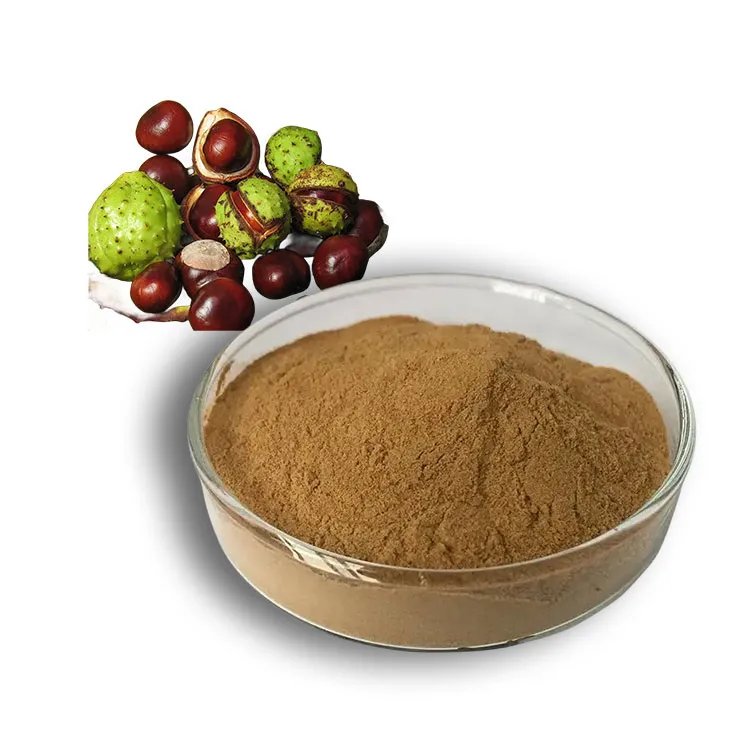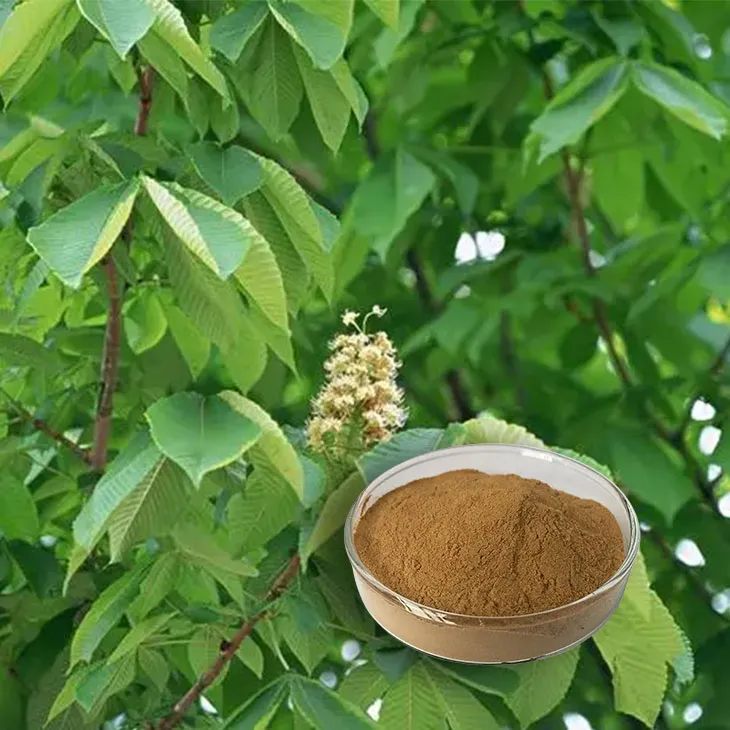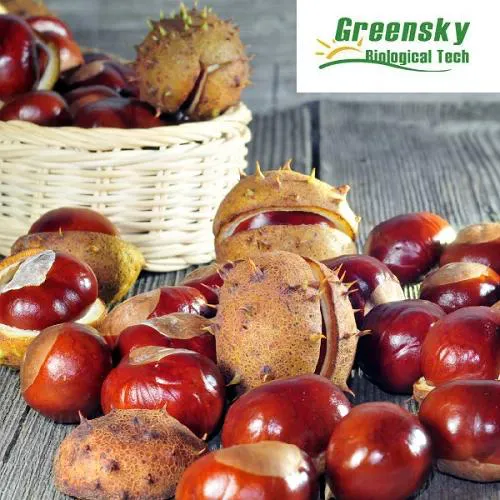- 0086-571-85302990
- sales@greenskybio.com
Five Effects of Horse Chestnut Extract + Dosage, Side Effects
2024-11-13

1. Introduction
Horse chestnut (Aesculus hippocastanum) extract has been used for centuries in traditional medicine for various health purposes. In modern times, scientific research has been carried out to explore its potential benefits, proper dosage, and possible side - effects. This article aims to provide a comprehensive overview of these aspects.

2. Five Main Effects of Horse Chestnut Extract
2.1 Improving Blood Circulation
One of the significant effects of Horse Chestnut Extract is its ability to improve blood circulation. It contains active compounds such as aescin, which has been shown to strengthen the walls of blood vessels. Aescin acts as a vasoconstrictor, which helps to reduce the permeability of capillaries. This can be beneficial in treating conditions such as varicose veins, where the veins become enlarged and twisted due to poor blood flow. By improving the integrity of blood vessels, Horse Chestnut Extract can help to relieve the symptoms associated with poor circulation, such as swelling, pain, and heaviness in the legs.
2.2 Relieving Pain
The extract also has analgesic properties. It can be effective in reducing pain, especially in cases related to inflammation in the joints or muscles. The anti - inflammatory nature of horse chestnut extract helps to reduce swelling and irritation in the affected areas, which in turn alleviates pain. For example, in individuals with arthritis, horse chestnut extract may provide some relief from joint pain. It is thought that the extract inhibits the production of certain inflammatory mediators in the body, such as prostaglandins, which are involved in the pain and inflammation process.
2.3 Anti - Inflammatory Activity
As mentioned earlier, horse chestnut extract exhibits strong anti - inflammatory activity. Inflammation is a natural response of the body to injury or infection, but chronic inflammation can lead to various health problems. The extract helps to regulate the body's immune response and reduce excessive inflammation. This makes it potentially useful in treating a range of inflammatory conditions, not only in the joints but also in other parts of the body, such as the skin. For instance, it may be beneficial in cases of eczema or dermatitis, where the skin is inflamed.
2.4 Reducing Edema
Edema, or swelling, is often a result of fluid accumulation in the tissues. Horse chestnut extract can be effective in reducing edema. Its ability to improve blood vessel function and reduce capillary permeability helps to prevent the leakage of fluid into the surrounding tissues. This is particularly useful in conditions such as post - surgical swelling or swelling in the lower extremities due to venous insufficiency. By reducing edema, the extract can also improve the overall comfort and mobility of the affected individuals.
2.5 Protecting Vein Health
Horse chestnut extract is beneficial for vein health. It helps to keep the veins elastic and functioning properly. This is crucial in preventing conditions like varicose veins and deep - vein thrombosis. The extract's action on strengthening the vein walls and improving blood flow within the veins reduces the risk of blood clot formation and the development of varicose veins. It also promotes the proper return of blood from the legs to the heart, which is important for overall cardiovascular health.

3. Dosage of Horse Chestnut Extract
The appropriate dosage of horse chestnut extract can vary depending on the form of the extract (e.g., capsule, tincture), the condition being treated, and the individual's overall health. In general, for standardized horse chestnut extract containing 15 - 20% aescin, the recommended dosage is usually around 150 - 300 mg per day, divided into two or three doses.
When using horse chestnut extract for treating varicose veins or improving blood circulation, a typical starting dose might be 150 mg per day. If no adverse effects are observed after a week or two, the dose can be gradually increased to 300 mg per day if necessary. However, it is always important to consult a healthcare professional before starting any new supplement regimen, especially for those with pre - existing medical conditions or those taking other medications.

4. Side Effects of Horse Chestnut Extract
4.1 Gastrointestinal Disturbances
One of the most common side effects of horse chestnut extract is gastrointestinal disturbances. This can include symptoms such as nausea, vomiting, abdominal pain, and diarrhea. These symptoms may occur more frequently when higher doses of the extract are taken or when the individual has a sensitive stomach. To minimize these side effects, it is advisable to take the extract with food and start with a lower dose and gradually increase it as tolerated.
4.2 Allergic Reactions
Some individuals may be allergic to horse chestnut extract. Allergic reactions can range from mild, such as skin rashes, itching, or hives, to more severe reactions, including difficulty breathing or swelling of the face, tongue, or throat. If any signs of an allergic reaction are noticed after taking the extract, it should be discontinued immediately, and medical attention should be sought.
4.3 Interaction with Medications
Horse chestnut extract may interact with certain medications. For example, it may potentiate the effects of anticoagulant medications, increasing the risk of bleeding. This is because the extract also has some blood - thinning properties. It is crucial for individuals taking anticoagulants or other medications to inform their healthcare provider before using horse chestnut extract to avoid potential adverse drug interactions.
5. Conclusion
Horse chestnut extract has several potential benefits, including improving blood circulation, relieving pain, reducing inflammation, decreasing edema, and protecting vein health. However, it is important to be aware of the appropriate dosage and possible side - effects. Consulting a healthcare professional before using horse chestnut extract is highly recommended to ensure its safe and effective use.
FAQ:
What are the five effects of Horse Chestnut extract?
The five main effects of Horse Chestnut extract include improving blood circulation, which helps in better oxygen and nutrient delivery throughout the body. It also has anti - inflammatory properties, reducing inflammation in various parts of the body. Another effect is pain relief, which can be beneficial for conditions like joint pain or muscle soreness. Horse Chestnut extract can assist in reducing swelling, often associated with venous insufficiency. Additionally, it may support the health of blood vessels, maintaining their integrity and function.
What is the appropriate dosage of Horse Chestnut extract?
The appropriate dosage of Horse Chestnut extract can vary depending on the form (such as capsules, tablets or liquid) and the intended use. In general, for standardized extracts, a common dosage range is 150 - 300 mg per day. However, it is always best to consult a healthcare provider before starting any new supplement regimen to ensure the dosage is appropriate for an individual's specific health needs.
What are the possible side - effects of Horse Chestnut extract?
Some possible side - effects of Horse Chestnut extract include nausea, stomach upset, and in some cases, allergic reactions. It may also interact with certain medications, so it is crucial to inform your doctor if you are taking other drugs. High doses may increase the risk of bleeding, especially in individuals with bleeding disorders or those taking anticoagulant medications.
How does Horse Chestnut extract improve blood circulation?
Horse Chestnut extract contains active compounds like aescin, which has been shown to strengthen the walls of blood vessels. By strengthening the vessels, it can help improve the flow of blood through them, reducing the pooling of blood in the legs (a common problem in venous insufficiency). It also has antioxidant properties that protect the blood vessels from damage, further enhancing blood circulation.
Can Horse Chestnut extract be used for chronic pain?
Horse Chestnut extract may be used for chronic pain, especially pain associated with conditions like arthritis or chronic venous insufficiency. Its anti - inflammatory and pain - relieving properties can potentially provide relief. However, it should not be used as a sole treatment for chronic pain, and individuals should always consult a healthcare provider to determine the underlying cause of the pain and develop a comprehensive treatment plan.
Related literature
- The Effects of Horse Chestnut Extract on Vascular Health"
- "Horse Chestnut Extract: Dosage, Efficacy and Safety"
- "An Overview of the Therapeutic Applications of Horse Chestnut Extract"
- ▶ Hesperidin
- ▶ citrus bioflavonoids
- ▶ plant extract
- ▶ lycopene
- ▶ Diosmin
- ▶ Grape seed extract
- ▶ Sea buckthorn Juice Powder
- ▶ Beetroot powder
- ▶ Hops Extract
- ▶ Artichoke Extract
- ▶ Reishi mushroom extract
- ▶ Astaxanthin
- ▶ Green Tea Extract
- ▶ Curcumin Extract
- ▶ Horse Chestnut Extract
- ▶ Other Problems
- ▶ Boswellia Serrata Extract
- ▶ Resveratrol Extract
- ▶ Marigold Extract
- ▶ Grape Leaf Extract
- ▶ blog3
- ▶ blog4
- ▶ blog5
-
Organic Tongkat Ali extract powder factory.
2024-11-13
-
How to make powder with ashwagandha extract.
2024-11-13
-
Rosehip extract manufacturers from China.
2024-11-13
-
The best cat's claw extract in nature.
2024-11-13
-
Chinese Dandelion Leaf Extract Suppliers.
2024-11-13
-
Uridine-5'-monophosphate Disodium salt
2024-11-13
-
American Ginseng Root Extract
2024-11-13
-
Hawthorn powder
2024-11-13
-
Dan Shen Root Extract/Salvia Root Extract
2024-11-13
-
Milk Thistle Extract
2024-11-13
-
Saw Palmetto Extract
2024-11-13
-
Lycopene
2024-11-13
-
Centella Asiatica Extract
2024-11-13
-
Citrus Aurantium Extract
2024-11-13
-
Fig Extract
2024-11-13





















